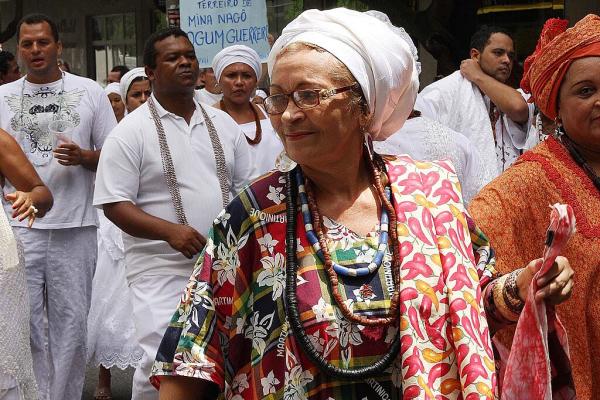
Join CLAS and the Department of Spanish and Portuguese as Brazilian poet and literary scholar Camila do Valle will present and discuss her research on Afro-Amazonian cosmologies. She will have as special guest high priestess Mametu Nangetu. Their presentation will include a screening of a short film from the series Guardians of the Forest. This event will be held in Portuguese.
Abstract
Mametu Nangetu is the protagonist of the short film, Mametu Nangetu: The Forest and the Sacred (Betse de Paula, 2019). Renowned for her leadership in movements advocating for the rights of women, Black people, and Afro-Amazonian religious communities, Mametu is the founder of the Mansu Nangetu Bantu Kuenkue terreiro, sacred grounds located in Pará. She is also the coordinator of the Nangetu Institute of Afro-Religious Tradition and Social Development, which has received several awards from IPHAN (the National Brazilian Historic and Artistic Heritage Institute) for projects such as Azuelar, that combines audiovisual and digital communication to promote Afro-Brazilian knowledge. Mametu has participated in committees mapping traditional communities in Belém, a project spearheaded by Brazilian government entities in partnership with UNESCO and the Palmares Cultural Foundation. Mametu Nangetu: The Forest and the Sacred is based on the research project, Social Cartography of Afro-Religiosities in the Amazon. The project was conducted within the scope of the National Program of Intangible Heritage by IPHAN, with a council formed by the priests—Pai Luís Tayandô, Mametu Nangetu, Mãe Nalva, Pai Walmir, and Mãe Jokolosy—as well as the researcher and technical coordinator professor Camila do Valle, a widely published poet and scholar from the Federal Rural University of Rio de Janeiro (UFRRJ). Camila recalls that during the 2009 survey, 161 terreiros were identified in Belém, along with over 3,000 Afro-religious practitioners.
